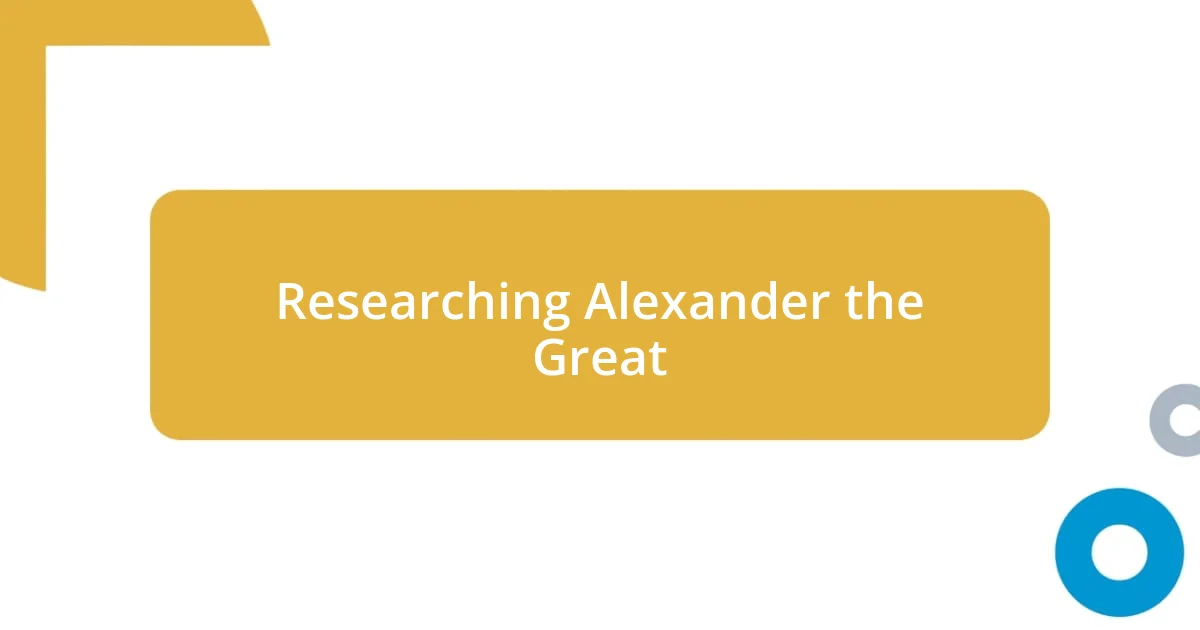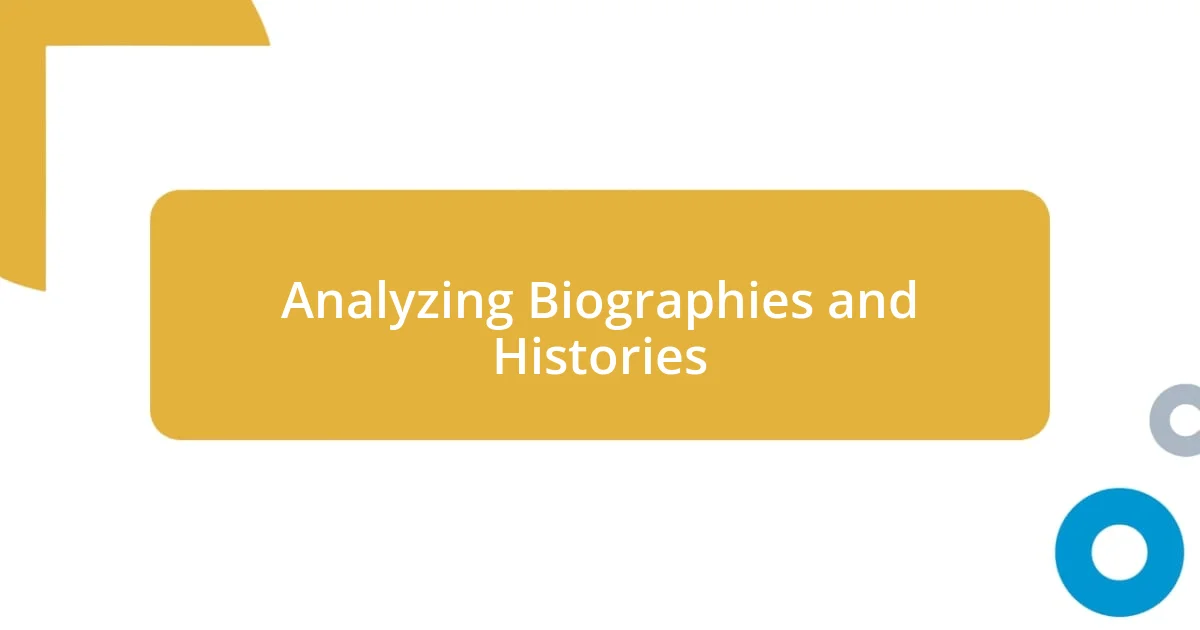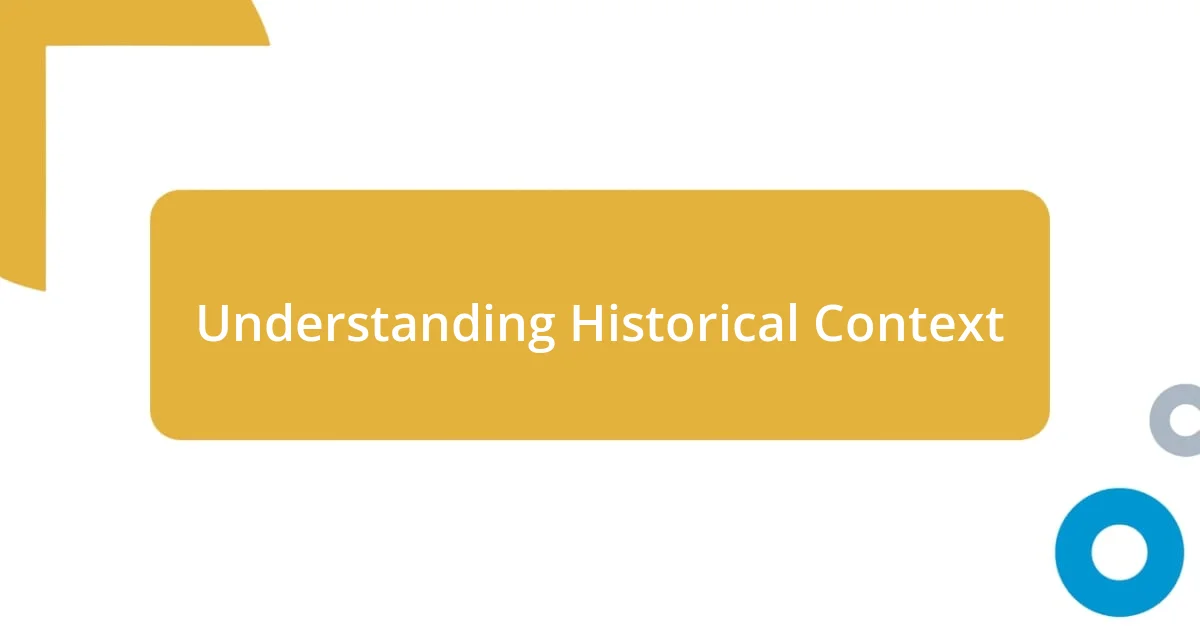Key takeaways:
- Alexander’s early education by Aristotle significantly influenced his strategic thinking and approach to leadership.
- Different historical perspectives highlight the complexity of Alexander’s character, showcasing the subjective nature of historical narratives.
- Synthesizing information about Alexander reveals parallels between his struggles for ambition and contemporary personal aspirations, emphasizing the importance of ethical considerations in the pursuit of greatness.

Researching Alexander the Great
Diving into the life of Alexander the Great is like stepping into a grand epic filled with intrigue and ambition. I recall the moment I stumbled upon his early education under Aristotle—how intriguing it was to learn how his brilliant mind was cultivated by one of history’s greatest philosophers! Imagine being trained in the arts, sciences, and philosophy, all while preparing to lead armies. It made me wonder: how much of Alexander’s later strategies were shaped by those early lessons?
As I sifted through historical accounts, I was struck by the sheer diversity of opinions surrounding Alexander’s character. Some hailed him as a hero, while others depicted him as a ruthless conqueror. This duality spoke to me; it’s fascinating how one person’s vision of greatness can be seen as tyranny by another. Have you ever considered what drives someone to pursue greatness at any cost? I found myself reflecting on our own quests for success in life and the complexities involved.
I also delved into the role of geography in shaping Alexander’s campaigns. Each route he took was laden with both opportunity and peril. While studying maps of the ancient world, I could almost feel the weight of his ambition. Picture the dust kicking up beneath his horse’s hooves as he rode into unknown lands. Isn’t it astonishing how the interplay of environment and determination can script the pages of history?

Selecting Primary Sources
Selecting primary sources for studying Alexander the Great is a crucial step that can greatly impact your understanding of his life and legacy. Personally, I often feel a thrill when I come across firsthand accounts from ancient historians like Arrian and Plutarch. Their narratives provide unique perspectives, and I’ve found it enlightening to compare how different writers interpreted the same events. Have you ever noticed how the tone of a source can change your perception of an individual?
As I went deeper into my research, I realized how vital it is to assess the context in which these sources were created. For example, I found that biases and agendas often colored historical narratives. It reminded me of the thrill of piecing together a puzzle; each fragment of information helps create a more nuanced picture. Are you aware of how personal experiences of the authors might influence their portrayal of Alexander? It’s interesting to think about how each historian’s background can shed light on their interpretation of events.
When selecting primary sources, I advise keeping a varied approach by incorporating different types of documents such as letters, military reports, and even archaeological evidence. Each source style brings its own richness to your understanding. This diversity not only enhances your analysis but also allows for a more rounded view of Alexander’s multifaceted character. I remember the excitement I felt when I uncovered a fragment of a letter attributed to Alexander himself—it felt like holding a direct connection to the past.
| Type of Source | Example |
|---|---|
| Ancient Historians | Arrian’s “Anabasis of Alexander” |
| Biographies | Plutarch’s “Life of Alexander” |
| Letters | Epistles attributed to Alexander |
| Archaeological Evidence | Ruins of cities he founded |

Analyzing Biographies and Histories
Analyzing biographies and histories reveals not just the events of Alexander’s life, but the vast array of interpretations that color our understanding of him. I remember poring over various biographies, each one a different lens through which to view his conquests and philosophies. It struck me how the same events could be painted in shades of admiration or criticism depending on the author’s perspective. This realization led me to question: what biases might I have when interpreting the sources myself?
- Diverse accounts show how history is often subjective.
- The impact of an author’s background is critical in shaping narratives.
- Vivid descriptions can enliven the past but may also distort truths.
As I dove deeper into my analysis, I became fascinated by how historical contexts influenced interpretations of Alexander’s actions. For instance, the brutal tactics he employed during his campaigns sparked intense debate among historians. When reflecting on these perspectives, I felt a genuine sense of connection to the complexities of human nature—after all, don’t we all have our battles with ethics and ambition? Seeing Alexander not just as a conqueror, but as a deeply flawed individual, helped me appreciate the layers behind his legacy. Each biography opened new avenues of thought, compelling me to engage with history not just as a series of events, but as a collection of human experiences.

Understanding Historical Context
Understanding the historical context in which Alexander the Great lived can feel like stepping into a time machine. When I delved into the geopolitical landscape of the 4th century BCE, I was struck by how a confluence of factors—like the rising power of Macedonia and the threat of the Persian Empire—shaped Alexander’s ambitions. Have you ever imagined how your goals might shift if the world around you demanded it? That’s precisely what I felt as I studied how these dynamics influenced his strategies and decisions.
I also found it enlightening to consider the cultural context of ancient Greece. The ideals of heroism and honor were pervasive, and I couldn’t help but wonder how these values propelled Alexander toward greatness. In my own life, I often reflect on the standards set by society—do they push us to achieve more or distort our true selves? Similarly, I recognized that the pressure on Alexander to embody these ideals often led him to make choices that were simultaneously remarkable and tragic.
Together, these historical contexts deepen our understanding of Alexander as not merely a conqueror but as a product of his time. I remember being moved by accounts of how his encounters with diverse cultures sparked both admiration and hostility. This complexity made me realize that our modern narratives of leadership often overlook the intricate web of influences that shape a person’s legacy. As I researched, I began to appreciate the delicate balance between ambition and humanity—an awareness that I believe enriches any study of historical figures.

Comparing Different Perspectives
It’s fascinating how different biographical accounts can lead us to truly varied perceptions of Alexander the Great. I recall a moment when I encountered two starkly different interpretations of the same battle—one painting him as a heroic liberator and the other as a ruthless tyrant. This contrast not only sparked my curiosity but also made me ponder: how can individuals witness the same events and draw such opposing conclusions? When I finally understood that these interpretations were shaped by the authors’ backgrounds and biases, it shifted my approach to studying historical texts.
As I explored various texts, I couldn’t help but notice the emotional undertones each historian infused into their writings. Some authors romanticized Alexander’s exploits, using vivid imagery that made my heart race while others employed a more clinical detachment that left me feeling cold. I remember sitting with a cup of coffee, captivated by a particularly dramatic passage detailing Alexander’s tumultuous relationship with his troops. It made me ask myself: what drives a leader to inspire such loyalty and fear in equal measure? These differing emotional tones profoundly colored the narratives, reminding me that history is as much about feeling as it is about facts.
Comparing these perspectives opened my eyes to the complex tapestry of human behavior throughout history. One day, I found myself frustrated while reading a critical account that questioned Alexander’s motives, labeling him as a megalomaniac. Initially, I resisted this view, feeling a deep connection to his ambition. But then it hit me—couldn’t I, too, have moments where my ambition overshadows my better judgment? This reflection solidified my belief that every historical figure deserves a nuanced exploration. Understanding these differing perspectives on Alexander helped me appreciate not just his multifaceted legacy but the broader theme that runs through all of history: the endless dance between intention and perception.

Synthesizing the Information
When synthesizing the vast array of information about Alexander the Great, I found it helpful to create a personal framework that highlighted key themes in his life. I remember jotting down notes on a whiteboard, connecting different events and ideas with colorful pens, almost like a mind map of his ambitions, personality traits, and the historical influences surrounding him. This visual approach made it easier to see patterns emerge, revealing how his relentless pursuit of glory was often intertwined with his relationships with allies and enemies alike. Have you ever had that ‘aha’ moment when everything just clicks into place? That’s the magic of synthesis—it allows disparate pieces of information to transform into a coherent narrative.
As I delved deeper, I couldn’t help but reflect on the motivations that drove Alexander’s conquests. While reading about his encounters in Persia, I felt a pang of empathy toward him when I considered the burden of leading such vast armies under constant threat. It reminded me of a time I had to lead a project with tight deadlines and high expectations—every decision felt monumental, and the pressure was palpable. Just as I had to balance my team’s morale with the project’s demands, Alexander often grappled with the delicate interplay of maintaining loyalty among his men while pushing for expansive victories.
Ultimately, synthesizing the information allowed me to appreciate Alexander not simply as a historical figure but as a person grappling with ambition, struggle, and the legacies he would leave behind. In piecing together the various threads of his life, I began to see reflections of my own experiences in my pursuit of knowledge and success. Does history not teach us that the complexities of our human nature reign supreme? As I came to this realization, I understood that each distilled insight helped breathe new life into Alexander’s story, making it not just about ancient wars but about ambition, inspiration, and the lessons we can learn even today.

Presenting My Findings
In presenting my findings, I felt compelled to highlight Alexander’s duality as both a visionary leader and a deeply flawed individual. A moment that resonated with me was when I stumbled upon a passage describing his overwhelming desire for glory, which starkly contrasted with vivid accounts of his more vulnerable moments, like the loneliness of command. Isn’t it fascinating how the weight of power can sometimes feel isolating? This realization helped me understand that while Alexander’s achievements were monumental, his internal struggles added depth to his character.
I also found it revealing to look at the relationships he forged and fractured throughout his life. Reflecting on a particularly poignant account of his bond with his closest companion, Hephaestion, made me think about my own friendships and the impact they have on my journey. Have you ever had a friend whose faith in you propelled you to achieve the seemingly impossible? Alexander’s deep affection for Hephaestion mirrored the kind of loyalty that can motivate us to push beyond our limits, reminding me of the significance of connection in our endeavors.
Moreover, presenting these findings encouraged me to question how Alexander’s story resonates with us today. As I pondered over the lessons learned from his life, I found myself considering my ambitions and the potential consequences of relentless pursuit. Does strife cultivate greatness, or does it come at an unspoken cost? This introspection left me acknowledging that our aspirations should be tempered with ethical considerations, just as Alexander’s legacy challenges us to navigate the fine line between glory and ruthlessness.














